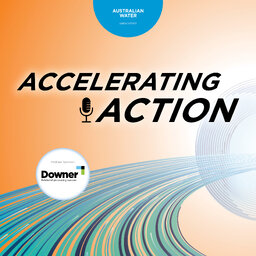In the latest episode of the Accelerating Action podcast, Mark Newland, Technical Director for Water at Downer sits down with host Jo Taranto to discuss Membrane Bioreactors.
Membrane bioreactors (MBRs) are combinations of membrane processes like microfiltration or ultrafiltration with a biological wastewater treatment process, the activated sludge process. These technologies are now widely used for municipal and industrial wastewater treatment.
“Activated sludge has been around since the early 1900’s”, said Mark.
“The MBRs technology are somewhat of a step change in the industry in the early 2000s and we first started to have a look at the adoption of membranes in 2002-2003. There were few reference plants in in the world, it was quite early in the commercialisation stage worldwide at that time and [with] very few suppliers as well. Our first MBR was a plant at Victor Harbour in South Australia which was designed in 2003, commissioned in 2005 and at the time it was only the second MBR in Australia and by far the largest. It has a dry weather capacity of about 5 megalitres per day.”
Mark notes that since 2005, Downer have been using a different type of membranes called hollow fibre membranes.
Advantages of MBRs
The initial selling point for MBRs focused on how they require less space than a conventional treatment plant.
“If you fast forward through years of population growth in Australia, it's quite common that we're now finding treatment plants [that once had large amounts of space] are now constrained and they just don't have the space for expansion of the conventional process,” said Mark.
“The advantage of the MBR being compact is important in this day and age”.
MBR technology is cheaper compared to standard treatment plants due to requiring lower quantities of materials including big ticket items e.g., concrete and steel. MBRs are quicker to build, require less labour.
“If I think about my time in the industry, we've seen a couple of periods where construction costs have escalated substantially, the first of those periods was in the in the first mining boom and just more recently, treatment plant costs have practically doubled but in the meantime, membrane costs have been reducing. We're paying less for membranes than we did in the early days”, said Mark.
Key learnings
“I think it's fair to say that over the years we've got most things right but there are certainly some good lessons in both our Downer and the water industry toolkits”, said Mark.
He also points to the importance of having robust screening both upfront and continuous as a factor in why MBRs have been successful.
“We've certainly had experiences with certain types of screens that are not as reliable as others”, said Mark.
“Another important lesson is not to feed a membrane tank from one end and take the water out of the other because that overconcentrates the activated sludge and so some of the membranes are having to work a lot harder than others”.
What's next for membrane bioreactors?
Mark ends the podcast episode by relaying that there will be future development on MBRs and improved flux rates.
“We'll continue to see development... we're continuing to improve the integration of the membranes with the biological process, and we continue to achieve better efficient quality with respect to nitrogen phosphorus”, said Mark.
“With more operating experience, I'd expect to see adoption of MBR technology for upgrading of existing plants will become commonplace as it just makes so much sense from a sustainability cost, space, excellent quality and ease of operation perspective”.
Thank you to our host Jo Taranto and our guest Mark Newland for their time.
Season 8, Accelerating Action is proudly sponsored by Downer
 Australian Water Association Podcast
Australian Water Association Podcast


